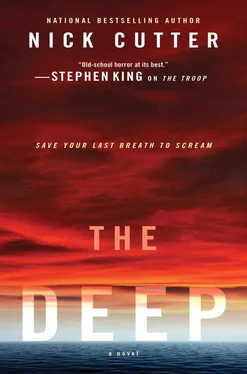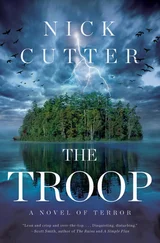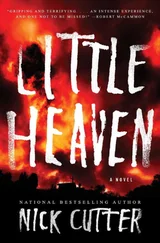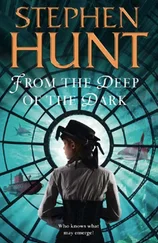Clayton nodded impassively. “As long as you don’t disturb my lab or intrude on my work.” A hard look at Luke. “Either of you.”
“Wouldn’t dream of it,” said Al.
Clayton’s face reminded Luke of a blanket pulled over a nest of scorpions: seemingly tranquil, but with all manner of thoughts and instincts twisting beneath it.
“Well then, come along.”
Clayton turned and walked away with every expectation they’d follow, treating them with the indifference you might accord to a pair of slack-jawed yokels who’d just fallen off the hay truck—which, Luke noted with an absence of bitterness, was how Clayton treated pretty much everybody he met. He’d always been an equal-opportunity disdainer.
DESPITE THE LOW CEILING,Clayton moved down the tunnel with the grace of a man who did not so much walk as he did float a millimeter or two above the ground, hovercrafting on a ribbon of air.
The tunnel was well lit. Warmth emanated from gilled vents. They walked in silence and squeezed single file through a gap where the tunnel winnowed to a bottleneck. Separated by a flimsy barrier of polymers and foam, Luke could feel the sea pressing against his skull. His eardrums throbbed from the pressure of that static silence.
Luke had never been particularly prone to claustrophobia; as a child, he’d navigated drainage tunnels and dusty attics, happy as a hamster in a Habitrail. But these tunnels truly resembled a kind of digestive tract, with their ridged walls and scalloped ceilings. No wonder Toy’s and Westlake’s mental states had eroded—on top of the pressure and isolation, they’d spent too much time pacing these sinister tubes.
They rounded a tight bend. Luke stopped so suddenly that LB butted into the backs of his legs, leaving a streak of drool on his overalls.
“Oh, you’ve got to be kidding me.”
The tunnel hit an abrupt stop. It was as if they’d reached a dead end… except for the circular hole in the wall at the end of the tunnel, about the size of a manhole. The mouth of the hole was dark, but Luke could see that it stretched off to meet some unknown terminus within the station.
“Relax,” said Al. “They’re called crawl-throughs. It’s a structural necessity. You’ll see the same thing at space stations: chutes connecting one area to the other, which the astronauts float through. We, unfortunately, are tethered by gravity. But at least it’s got rungs, just like a ladder. It’s a twenty-second trip, Luke. Piece of cake.”
Luke approached the chute. God, it was tiny—a choking ring. He could see straight through it, at least, to the lit tunnel on the other end. Rungs ran along its ceiling. But why had he thought it was the diameter of a manhole? It looked about as big around as the door on his clothes dryer, if that.
Clayton slid in on his stomach. He wriggled until his ass was past the chute’s mouth, transitioned onto his back, and gripped the rungs. He pulled himself through, grunting slightly in exertion; shortly afterward he slid out the other end.
“You go,” Al said to Luke. “Then the dog. Then me.”
Luke slid himself in. He tried to move as he’d seen his brother do, but it was difficult. He turned over awkwardly. A black tongue of foam ran around the chute, top to bottom. When he exhaled, his shoulders touched its edges: an uncomfortable feeling, one that made his knees rise to his chest instinctively—his kneecaps hit the top of the chute and made no sound at all. There was a terrible solidity to everything down here, put there by the water: he could have been crawling through an underground cave with a billion tons of rock pushing down.
It doesn’t matter , he told himself. If this chute collapses, you’ll be dead before your mind even registers the threat.
Gripping the rungs, he pulled himself through. The chute was coated with a helpful silicon agent: he slid as effortlessly as a plastic puck over an air-hockey table. He reached the other end, turned onto his stomach, and fell gracelessly onto the floor.
Clayton made no effort to help him up. “You really know how to make a guy feel welcome,” Luke said.
With some gentle coaxing, LB came next. She whined and whimpered, but Al gave her a push and the dog shot through the chute as if she’d been greased.
Once Al herself was through, they continued. The tunnel followed a gentle curve until it hit another hatch, which opened into a lab area. It was much larger than any room Luke had seen so far. His head nearly touched the overhead lights, which buzzed with an insectile hum. The lab was spartanly appointed: a few chairs, cardboard filing cabinets. Everything was collapsible, foldable, compressible—as it would have to be to have gotten down here. It’s not as if they could back up a moving truck to the Trieste ’s front door and let burly men in weight-lifting belts off-load supplies. It all would’ve been ferried down in the Challenger s, and been small enough to fit through their hatches.
Luke noted five hatches: the one they’d come through—marked Access 1—plus four more marked LN, LW, LT, and Access 2.
The second hatch, LW, was locked. Luke saw a keypad beside it. LW’s porthole was slicked from the inside with coagulated dark matter. A buzz emitted from behind the hatch, which quivered the delicate hairs of Luke’s inner ear.
A foldable lab bench was scattered with papers, most of them scrawled with his brother’s spiky handwriting. Petri dishes were stacked in a small cooler; empty MREs were heaped in a trash bin.
Luke said: “Is that a viewing window?”
“Yes,” Clayton said. “The only one of any size in the station.”
It stretched nearly floor-to-ceiling, perhaps eight feet across. Luke’s eyes charted the curve of the glass… was it glass? Probably not. Glass would shatter. Beyond lay a blackness so profound that it unrooted something in his chest.
Clayton flicked a switch. The interior lights dimmed. He flicked another. A bank of high-intensity spotlights flooded the ocean bottom.
THE SEA FLOORwas as flat as a ballroom. It unfurled to the farthest edge of the light’s reach—perhaps twenty feet—before rolling under a solid wall of darkness that no man-made light could penetrate. The marine snow drifted in seismic combers, gentle waves of motion… or as though something was moving cunningly under the surface.
Luke’s heartbeat thudded dully at his temples. He put a hand on the window. The mammoth density of the sea throbbed against his fingertips. He pictured spider-legged cracks forming in his reflection, then water needling through to slice his fingers off painlessly; next the window would shatter inward as the ceiling crumpled down, crushing him before he could make peace with God.
“We watch it out there,” Clayton said. “Perhaps it watches us, too.”
Luke saw it then, as though it had arrived on cue. Ambrosia. A solid sheet of the stuff. It drifted across the ocean floor, reminding Luke of a manta ray. It shaped itself into a playful O and rolled along like a hula hoop.
Luke got the oddest sense of being teased—it was like watching a lure jigged past his sightline, some canny angler making it dance and shimmy oh-so-invitingly in hopes Luke would lunge and take an incautious bite… then what?
Clayton said, “Magnificent, isn’t it?”
Luke caught a sense of shapes cavorting where the light turned granular. At the precise point where the spotlights faded and died, he swore he could see… things. They coalesced, solidifying into something swirling with angry movement, so large that the darkness could scarcely contain it, rushing at him swiftly—
Читать дальше












